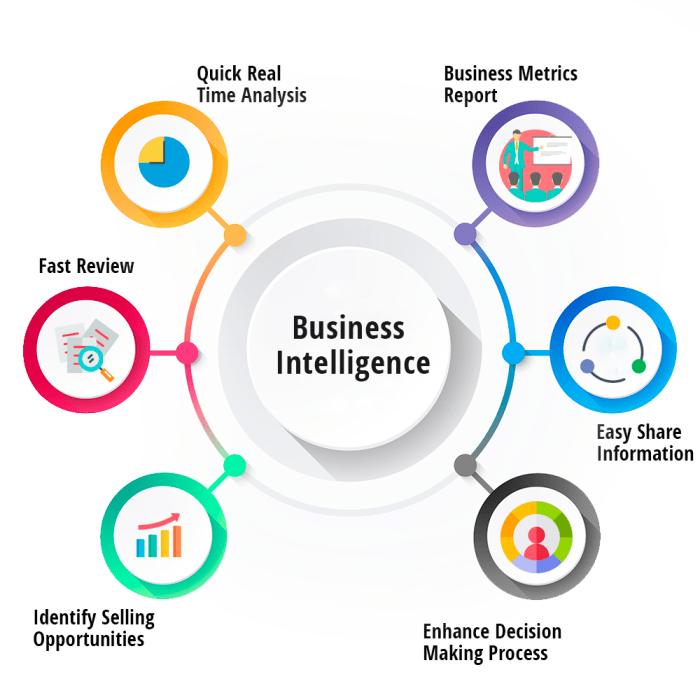BI for businesses is a game-changer, revolutionizing the way companies operate in today’s data-driven world. Dive into the realm of Business Intelligence and discover how it can transform your business strategy.
Importance of Business Intelligence (BI) for Businesses
Business Intelligence (BI) tools play a crucial role in helping businesses make informed decisions based on data-driven insights. By analyzing and interpreting large volumes of data, BI tools provide valuable information that can guide strategic planning and decision-making processes.
Implementing Business Intelligence systems can help organizations streamline their operations by providing real-time data and reports. These systems enable companies to monitor key performance indicators and track progress towards their goals effectively.
Enhancing Data-Driven Strategies
BI can enhance data-driven strategies for businesses by providing real-time analytics and reporting on key performance indicators. This allows companies to track their progress, identify trends, and make adjustments to optimize their operations.
When it comes to data analytics , businesses rely on powerful tools and technologies to analyze and interpret vast amounts of data. This process plays a crucial role in making informed decisions and gaining valuable insights into consumer behavior and market trends.
Successful Business Examples
- Amazon: Utilizes BI to analyze customer purchasing behavior and personalize recommendations, leading to increased sales and customer satisfaction.
- Netflix: Leverages BI to understand viewer preferences and tailor content recommendations, resulting in higher viewer engagement and retention.
- Walmart: Uses BI to optimize inventory management, pricing strategies, and supply chain operations, leading to cost savings and improved efficiency.
Key Components of Business Intelligence Systems

Business Intelligence (BI) systems consist of various key components that work together to provide actionable insights for businesses. These components include data integration, analytics, and reporting.
Data Integration
Data integration involves combining and consolidating data from different sources within an organization. This process ensures that all relevant data is gathered in one centralized location for analysis. By integrating data, BI systems can provide a comprehensive view of the organization’s operations and performance.
Analytics, BI for businesses
Analytics is a crucial component of BI systems as it involves the process of analyzing data to uncover meaningful patterns, trends, and insights. Through advanced analytics techniques such as predictive analytics and data mining, businesses can gain valuable insights into customer behavior, market trends, and operational efficiency.
Reporting
Reporting is the final component of a BI system, where the insights derived from data analysis are presented in a clear and understandable format. Reporting tools allow businesses to create dashboards, visualizations, and reports that communicate key performance indicators and metrics effectively to stakeholders.
Examples of popular BI tools that encompass these components include Tableau, Microsoft Power BI, and QlikView. These tools offer functionality for data integration, analytics, and reporting, enabling businesses to make informed decisions based on data-driven insights.
Benefits of Implementing BI in Business Operations

Implementing Business Intelligence (BI) in business operations can yield numerous benefits for organizations looking to streamline processes, enhance decision-making, and drive overall growth. By leveraging BI tools and technologies, businesses can gain valuable insights from their data to make informed decisions and optimize their operations.
Optimizing Operational Processes
- BI helps businesses identify inefficiencies in their operational processes and streamline workflows for improved productivity.
- By analyzing data in real-time, organizations can make adjustments on the fly to ensure optimal performance and efficiency.
- BI enables businesses to track key performance indicators (KPIs) effectively and make data-driven decisions to enhance operational effectiveness.
Improving Decision-Making Processes
- BI provides decision-makers with accurate and timely information, allowing them to make informed decisions based on data-driven insights.
- With BI, organizations can access interactive dashboards and reports that offer a comprehensive view of business performance, facilitating strategic decision-making.
- By forecasting trends and identifying patterns in data, BI empowers businesses to anticipate market changes and stay ahead of the competition.
Real-World Cases of BI Implementation
- Company XYZ implemented a BI system that allowed them to analyze customer data and identify buying patterns, leading to personalized marketing campaigns and increased sales.
- Retail giant ABC utilized BI tools to optimize their supply chain management, resulting in reduced inventory costs and improved product availability.
- Healthcare provider DEF implemented BI to analyze patient data and improve treatment outcomes, resulting in higher patient satisfaction and better overall healthcare delivery.
Challenges and Considerations in Adopting BI Solutions: BI For Businesses

Implementing Business Intelligence (BI) solutions in a business setting can come with its own set of challenges. It is essential to address these challenges effectively to ensure a successful adoption of BI systems.
Common Challenges in Implementing BI Systems
- Poor Data Quality: One of the major challenges in adopting BI solutions is ensuring the accuracy and reliability of the data being used. Inaccurate or incomplete data can lead to flawed insights and decisions.
- Integration Issues: Integrating BI systems with existing IT infrastructure and data sources can be complex and time-consuming. Compatibility issues may arise, causing delays in implementation.
- Scalability Concerns: As businesses grow, the volume of data generated also increases. Ensuring that the BI system can scale effectively to handle large amounts of data is crucial for long-term success.
Considerations in BI Adoption
- Data Quality Management: Establishing robust data quality management processes is essential to ensure that the data used in BI systems is accurate, complete, and consistent.
- Integration Strategy: Developing a well-thought-out integration strategy that considers the existing IT infrastructure and data sources can help in overcoming integration challenges effectively.
- Scalability Planning: Businesses should plan for scalability from the outset, considering future growth and data volume projections. Investing in scalable BI solutions can prevent issues as the business expands.
In conclusion, implementing BI can propel your business towards success by harnessing the power of data analytics. Embrace BI tools to stay ahead in the competitive market landscape.
Businesses leverage various Business Intelligence tools to enhance decision-making processes and drive growth. These tools offer advanced analytics capabilities, data visualization, and predictive modeling to support strategic planning and improve overall performance.



